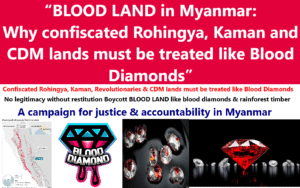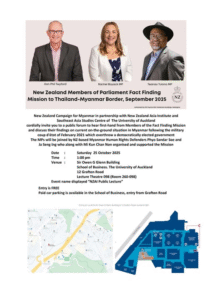Translated from Canada U Aung Tin’s FB
Former military officer Nay Myo Zin (Spring Revolution) has recently stirred controversy with his inflammatory rhetoric against Muslims, sparked by the government’s approval to build a mosque in Naypyidaw. His statements, amplified by hardline figures like U Wirathu and Ma Ba Tha members, as well as blind nationalist factions from both military and democratic camps, have escalated into a coordinated hate campaign over the past two weeks.
In reality, the mosque approval is not unprecedented. About a year ago, the government also granted permission to build Hindu temples and churches alongside the mosque. It wasn’t a mosque-only decision. Back then, these same nationalist voices remained silent—either unwilling or unable to protest—because the military hadn’t given them the green light.
Now, with elections approaching, the military appears to be weaponizing Islamophobia to suppress Muslim communities and manipulate public sentiment. This calculated timing has emboldened Ma Ba Tha and blind nationalists to launch aggressive campaigns.
If mosque construction is being accused of enabling arms deals with Pakistan and Iran, why isn’t the same logic applied to churches (Western countries) or Hindu temples (India)? Why the selective outrage, Nay Myo Zin?
To Nay Myo Zin, who has been vocal about anti-Muslim sentiments: If you’re truly concerned about foreign influence through religious infrastructure, why remain silent about China, Russia, and Israel—nations that supply Myanmar’s military with weapons daily? Why not speak out against Sinophobia, Russophobia, or anti-Semitism?
The truth is, Nay Myo Zin has long been known for his narrow-minded, ethnonationalist views. His past extremist remarks are well-documented. His attempts to portray himself as a revered figure—donning monk-like or princely personas—have been ongoing for years. Now, his deep-seated Islamophobia is surfacing, like muddy patches exposed by a storm.
Even though Naypyidaw has few Muslims, and mosque construction has been approved, the Muslim community lacks the financial means to build. Instead of focusing on new mosques, they prioritize reopening historic mosques in Meiktila and Taungoo, and restoring quake-damaged ones in Mandalay and Sagaing. A local Muslim leader posted this yesterday.
To U Wirathu, Ma Ba Tha leaders, military-aligned nationalists, and Spring Revolution figures like Nay Myo Zin: If your issue is truly with mosque construction, then ask Muslim leaders to sign a pledge not to accept the land. If you promise to stop inciting hate and violence, they will gladly relinquish the site.
This issue could be resolved easily—if the objection is genuine. But if the military is orchestrating this campaign as part of a dirty election strategy, then Muslims in Myanmar are being scapegoated, like lambs before wolves.
Note: While military affliated person Aye Nay Win has tried to prevent religious extremism (not because of his nature and long history of Islamophobic activities but because of scared of ICC prosecution), it is ironic that prominent Spring Revolution leader Nay Myo Zin is now fueling religious hatred. His post claims that mosque construction is a strategic move to gain military aid from Islamic countries like Pakistan and Iran, while Myanmar’s own religious institutions and children are left vulnerable.





